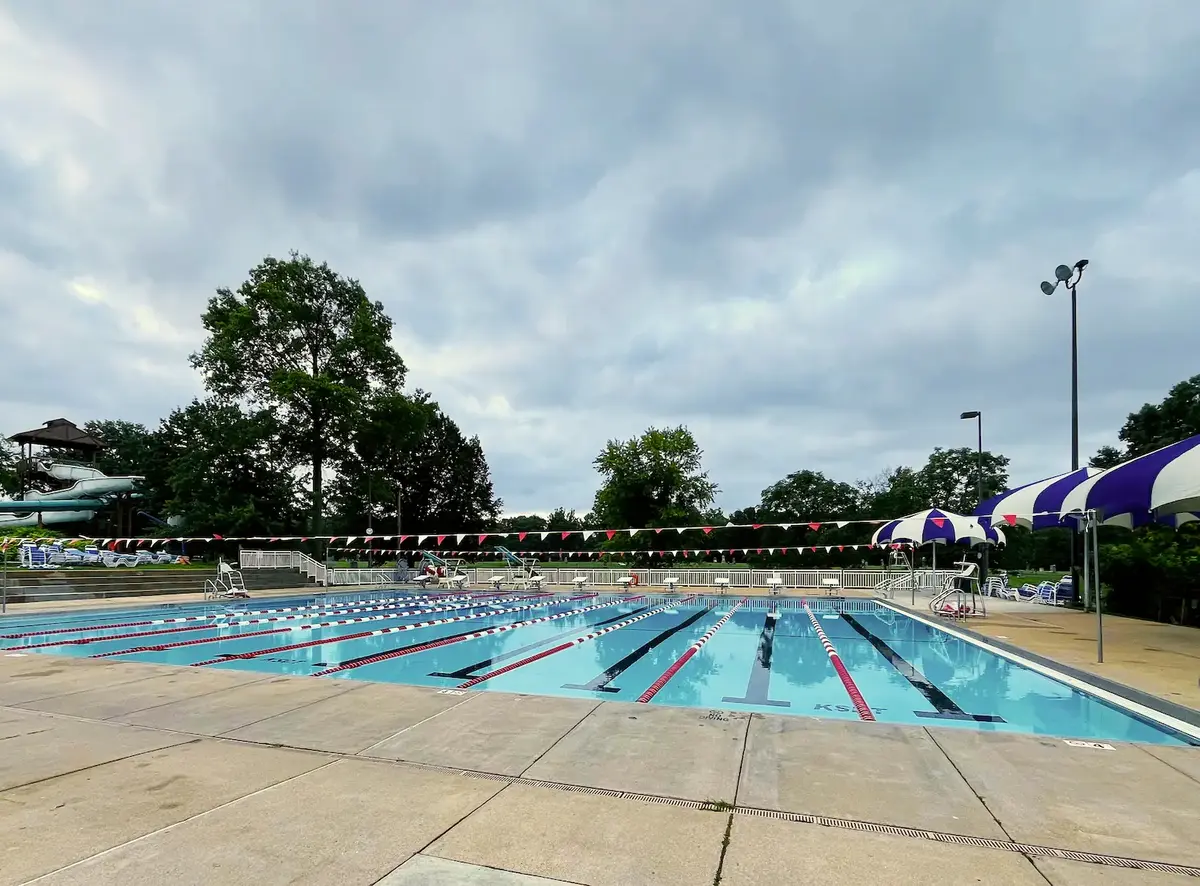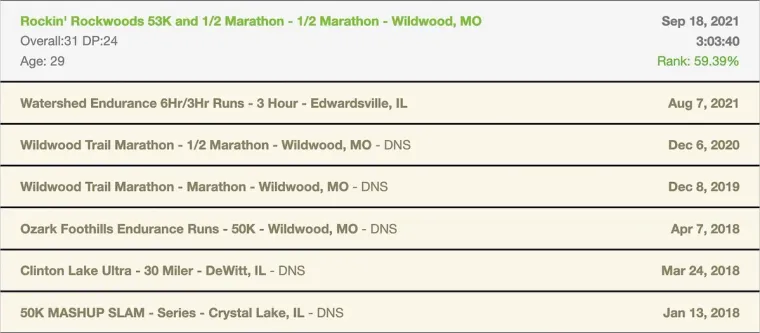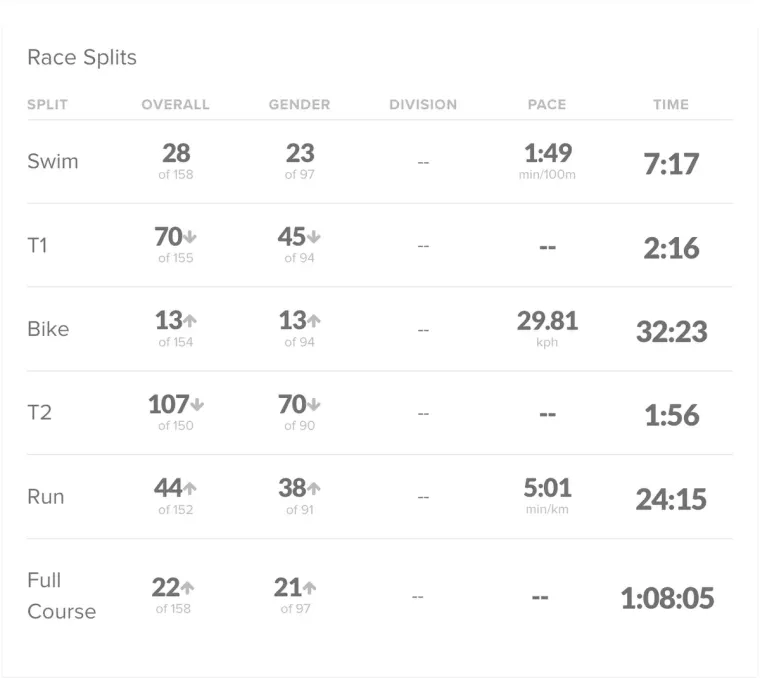How I Finally Finished My First Sprint Triathlon


IN THIS ARTICLE
My 7 DNSs might as well be DUIs.
You won't find my rap sheet in county, state, or federal records. I've never done time.
And yet, when I Google my name, I am haunted by these past crimes.
My rap sheet lives on the results section of UltraSignup, where the only thing worse than a Did-Not-Finish (DNF) is a Did-Not-Start (DNS).
A Did-Not-Finish is respectable.
You showed up, ready or not. At the very least, you made an earnest attempt to traverse the race course and cross the finish line.
But, you didn't make it. Something went awry along the way. Maybe your knee gave out. Maybe it was your stomach. Or, maybe somebody slipped you meth at an aid station you took the fight for first place too literally and were taken into police custody.
Chalk one or two Did-Not-Starts up to valid excuses. A missing catalytic converter or a sick kid on race-day morning.
Anything more than that? You're entering a territory where the misalignment between your training and ambitions is disrupting your personal life, health, and finances.
You might have a problem.
Chronic DNS manifests in would-be endurance enthusiasts from all walks of life. It doesn't discriminate.
Athletes often suffer from a DNS or two at some point during their racing career. Far fewer repeatedly pay hefty race registration fees before orphaning their race packets, never taking their assigned bib number to the starting line.
I fall into the later; I suffer from chronic DNS, and I have a problem. In fact, I DNS'ed an event in the time since I started writing this.
While my DNS odyssey traces its origins to 2016, my UltraSignup resume can attest that I’ve orphaned plenty of race packets and bib numbers in the time since.

An astute observer may notice that the August 2021 Watershed Endurance event doesn’t include a DNS appendage. There’s an error in their record keeping - I didn’t show up, promise.
In a similar spirit of transparency, readers should also know that I DNS'd an Olympic distance triathlon in northern Arizona in 2016, and for good measure, the Chicago triathlon a few weeks ago (2024). I also DNS'd a 5km running series during the winter of 2017. It was too cold and sleeping in sounded like the right idea at the time.
The same observer may also note that I turned around my legacy of abandoned race packets in September 2021, when I completed a trail half-marathon.
The race went poorly, and afterward, I put my endurance aspirations on hiatus.
I dipped my toe into CrossFit, cycling through three different local “boxes” before taking my lifts to the proverbial “garage gym” (in this case, an unfinished basement with annoyingly low ceilings). Fearful of inadvertently adding another DNS to my resume, I've held off registering for another race on UltraSignup.
Most race registration sites avoid publicly shaming event entrants who don't make it to the starting line.
UltraSignup’s unique value proposition helps remind those suffering from chronic DNS of their past failures during life's lower points, like Googling your name during a job search, which is at best an anxiety laden gut check that you haven’t self-sabotaged your chances of passing an HR department’s screening, and at worst self-indulgent egosurfing.
Do you think Strava's hiring managers immediately file resumes with lengthy Did Not Start histories into the Do Not Hire pile? Probably.
For the web-dev-tech inclined, it's worth noting that UltraSignup even goes so far as to style your race results’ HTML with a .dns CSS class name.
It's as if their developers unabashedly highlight their users' failures, deliberately emphasizing the races that you wanted to run, but couldn't.

Of course, they include a .dnf class in their CSS styles too.
The easiest remedy to my DNS-insecurity might just be getting over myself. Let's be real, no one's looking at my race results anyway.
Or maybe I should break up with UltraSignup, change my name on the site and ignore the niche platform all together.
At this point, I’ve tried both, and neither worked. I can't shake the rap sheet, a lingering feeling that I need to atone, rectifying my UltraSignup resume and other false-starts.
I started "training" for an endurance event earlier this year. Without a race in mind, I shifted my fitness priorities from lifting to rebuilding my cardio base. I didn't know what I wanted to do, but I did know that I wanted to do something.
I eventually crawled back to UltraSignup, fantasizing about long races in far away places. I sporadically pursued race listings for months, but nothing felt right. That is, until my brother mentioned that he started swimming again, and we shared a brief exchange where the word "triathlon" was mentioned.
It clicked - I needed to go back to the beginning - to the first DNS.
In the summer of 2016, I signed up for a now defunct triathlon at Lake Powell, on the Arizona/Utah border. I casually trained for a couple of months while living with my brother in upstate New York, but life got in the way and I never made it out for the race.
After the conversation with my brother, I impulsively signed up for the Chicago Triathlon's Olympic distance, a 1.5km swim, 40km bike, and 10km run (imperially measured as a 0.93 mile swim, ~25 mile ride, and 6.2 mile run).
Why train for one sport when you can train for three?
With 8 weeks until the Chicago Triathlon and a new job, home sale, and move on the immediate agenda, I didn't have time to spare. I found a training plan and set it in motion.
I scrambled to find a cheap road bike on Marketplace, settling on a 2017 Trek 1.1 for $200, from a college student who appeared to be liquidating the belongings of his parent's garage. To prep for Chicago, I also signed up for a local sprint distance triathlon, scheduled halfway through the condensed training period.

Given my track record, impulsively registering for two multi-sport races that require several hours of dedicated training per week may not seem like a great way to recover from chronic DNS.
Low and behold, it wasn't. I never made the five-hour drive to Chicago. Life finds a way of getting in the way.
Training for your first triathlon in 8 weeks is a questionable idea, and fitting it into the calendar mid-move - objectively bad. The Chicago DNS could have been avoided with better planning, and while this behavior still falls into a somewhat problematic category, some good came out of the race registration.
If I didn't impulsively sign up for the Chicago Triathlon, I never would have registered for the local sprint triathlon, and not only did I start the sprint triathlon, I even managed to finish it! At least, this is the silver lining I'm embracing in the wake of several hundred dollars of lost race registration fees and lodging costs.
Despite only 4 weeks of training, the sprint triathlon went well - better than expected.

The results aren't mysterious. I subscribed to a training plan and stuck to it. Having a decent base level of fitness made cramming the triathlon training into 4 weeks possible.

What’s Next?
With one race under my belt, and another DNS'd, I'm feeling dangerously optimistic about registering for another race. And with the initial Substack published, I am eager to finish another update in 7 days or less [edit: the Substack has since been sunset - don't worry, you'll be the first to know if it makes a comeback].
